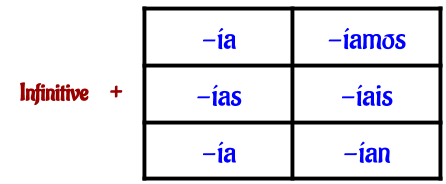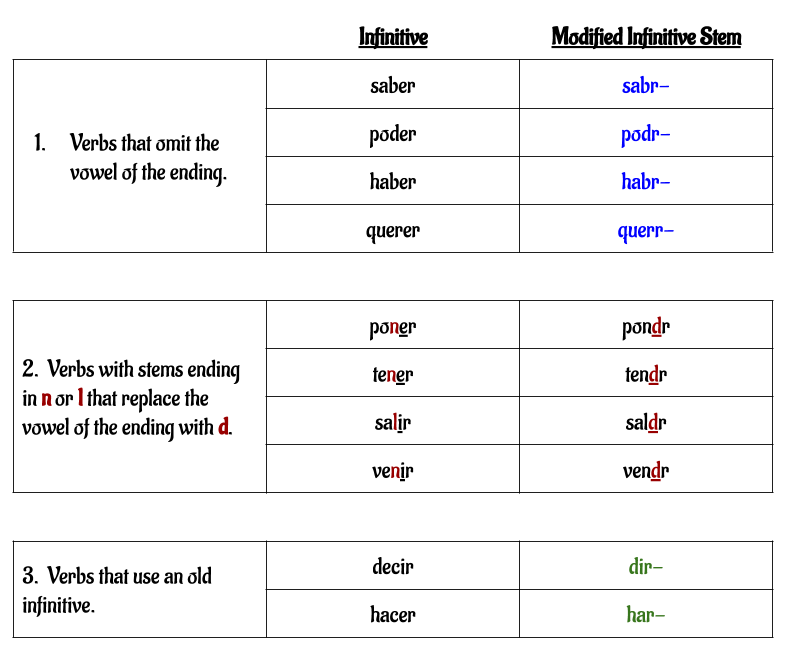El Condicional
The conditional tense is formed in a similar manner as the Future tense. It is formed by using the infinitive and adding the appropriate endings.
Examples:
Yo + hablar = Yo hablaría
Tú + comer = Tú comerías
Usted + vivir = Usted viviría
Nosotros + buscar = Nosotros buscaríamos
Ellos + perder = Ellos perderían
Also, the conditional tense will have the same irregular verbs. As listed below.
Yo + hablar = Yo hablaría
Tú + comer = Tú comerías
Usted + vivir = Usted viviría
Nosotros + buscar = Nosotros buscaríamos
Ellos + perder = Ellos perderían
Also, the conditional tense will have the same irregular verbs. As listed below.
Uses of the Conditional
To express speculation about the past:
Aquél día correrían más de veinticinco kilómetros.
That day they must have run more than 25 kilometers.
To express the future from the perspective of the past:
Yo sabía que abrirían la tienda a las siete.
I knew that they would open the store at seven o’clock.
To express hypothetical actions or events which may or may not occur:
Sería interesante estudiar chino.
It would be interesting to study Chinese.
To indicate what would happen were it not for some certain specific circumstance:
Yo viajaría pero no tengo dinero.
I would travel but I don’t have money.
For polite use to soften requests:
Por favor, ¿podría decirme a qué hora abre la gasolinera?
Could you please tell me what time the gas station opens?
To ask for advice:
¿Cuál compraría Ud.?
Which one would you buy?
For reported speech:
Juan dijo que terminaría el trabajo.
Juan said that he would finish the work.
To express what would be done in a particular situation:
¿Hablarías inglés en España?
Would you speak English in Spain?
No. Hablaría español.
No. I would speak Spanish.
*These examples are taken from StudySpanish.com
Aquél día correrían más de veinticinco kilómetros.
That day they must have run more than 25 kilometers.
To express the future from the perspective of the past:
Yo sabía que abrirían la tienda a las siete.
I knew that they would open the store at seven o’clock.
To express hypothetical actions or events which may or may not occur:
Sería interesante estudiar chino.
It would be interesting to study Chinese.
To indicate what would happen were it not for some certain specific circumstance:
Yo viajaría pero no tengo dinero.
I would travel but I don’t have money.
For polite use to soften requests:
Por favor, ¿podría decirme a qué hora abre la gasolinera?
Could you please tell me what time the gas station opens?
To ask for advice:
¿Cuál compraría Ud.?
Which one would you buy?
For reported speech:
Juan dijo que terminaría el trabajo.
Juan said that he would finish the work.
To express what would be done in a particular situation:
¿Hablarías inglés en España?
Would you speak English in Spain?
No. Hablaría español.
No. I would speak Spanish.
*These examples are taken from StudySpanish.com
Below is a website, Conjuguemos.com, where you can practice the conjugations.


